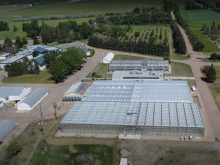Logging in British Columbia regions hit by pine beetles is ruining watersheds and drying up creeks that ranchers have relied on for more a century, said a B.C. rancher.
Randy Saugran, one of 18 ranchers in the small community of Big Creek, B.C., said logging companies are taking advantage of a “loophole” in legislation that allows them to clear cut 93 percent of the trees on their ranch land.
Without trees on the hills, water rushes off the mountains in spring, which leaves creeks and streams dry in summer. That means cattle have no water sources.
Read Also

Alberta crop diversification centres receive funding
$5.2 million of provincial funding pumped into crop diversity research centres
“There is no water held back by the trees. Even dead jack pine hold back 50 percent of the snow and water. They’re logging out our watersheds,” said Saugran, referring to Tolko and West Fraser, the two main logging companies in the area.
The 30 kilometres between his ranch and his nearest neighbour is one continuous clearcut, he said.
Saugran said their community, about 100 kilometres west of Williams Lake, has attracted logging companies because it is relatively close to mills at Williams Lake.
Mike Pederson, Cariboo-Chilcotin district manager for the Ministry of Forests, Lands and Natural Resource Operations in Williams Lake, said logging companies are doing nothing illegal.
“In any of the work we’ve done shows the companies are in compliance with the stewardship plan, the blocks are in compliance with site plan, even forest practice board audits show the company is in compliance,” said Pederson.
Pederson said he hasn’t seen the Big Creek area, but rules are in place to protect the trees and environment around mule deer ranges and areas around streams and creeks.
“In the area Randy is in, the company is retaining spruce where they can to provide a riparian feature for those streams.”
He said a continuing drought in the area west of the Fraser River is bringing water issues to the forefront. Harvesting the dead trees quickly is one way of turning the forests from a dead landscape back to a viable habitat, he said.
“If the tree falls down, it holds back some snow but its roots don’t hold back water. If it’s left standing, dead pines don’t transpire and (it) takes a longer time to get an under story of vegetation.”
“At the end of 35 years they should be functioning as a mature stand.”
Economics drives the forest business and with small margins, logging companies must harvest lumber in the most economically viable locations, said Pederson. That means locations close to the mills, like Big Creek.
“Obviously, when they look for wood, they look for the greatest economic return for the least amount of dollars that are invested.”
Tom Hoffman, manager of the Cariboo regional woodland for Tolko Industries, a forestry company operating near Williams Lake, said the company has made concessions in its logging practices to take into account Saugstad’s concerns.
He said it’s not logging, but a combination of dead trees from mountain pine beetles and climate change that is causing the greatest problem to the hydrology of the area.
“I believe the problems of Mr. Saugstad’s would have occurred whether we logged the area or not. I have no empirical evidence that our logging practices are the cause of his concerns.”
Meanwhile, Saugran said land-use plans drawn up during the 1980s, which were designed to protect the environment, endangered species and wildlife while also allowing ranchers and logging companies to coexist, agreed to allow logging companies to take 30 percent of the timber from an area every 30 years. It takes about 30 years for a replanted forest to become economically viable.
However, logging companies have since been encouraged to salvage timber killed by pine beetles, which has amounted to millions of acres of trees across the province.
Saugran said he understands the need to log the dead timber, but would like the logging spread out more across the region.
“The mills do not care if we survive. We are only an inconvenience to them. They say they engage in consultation but it is absolutely meaningless. They listen to our concerns and then continue on with business as usual without addressing any of them,” said Saugran in a letter read out at his local B.C. Cattlemen’s Association meeting and approved by the members in attendance.














